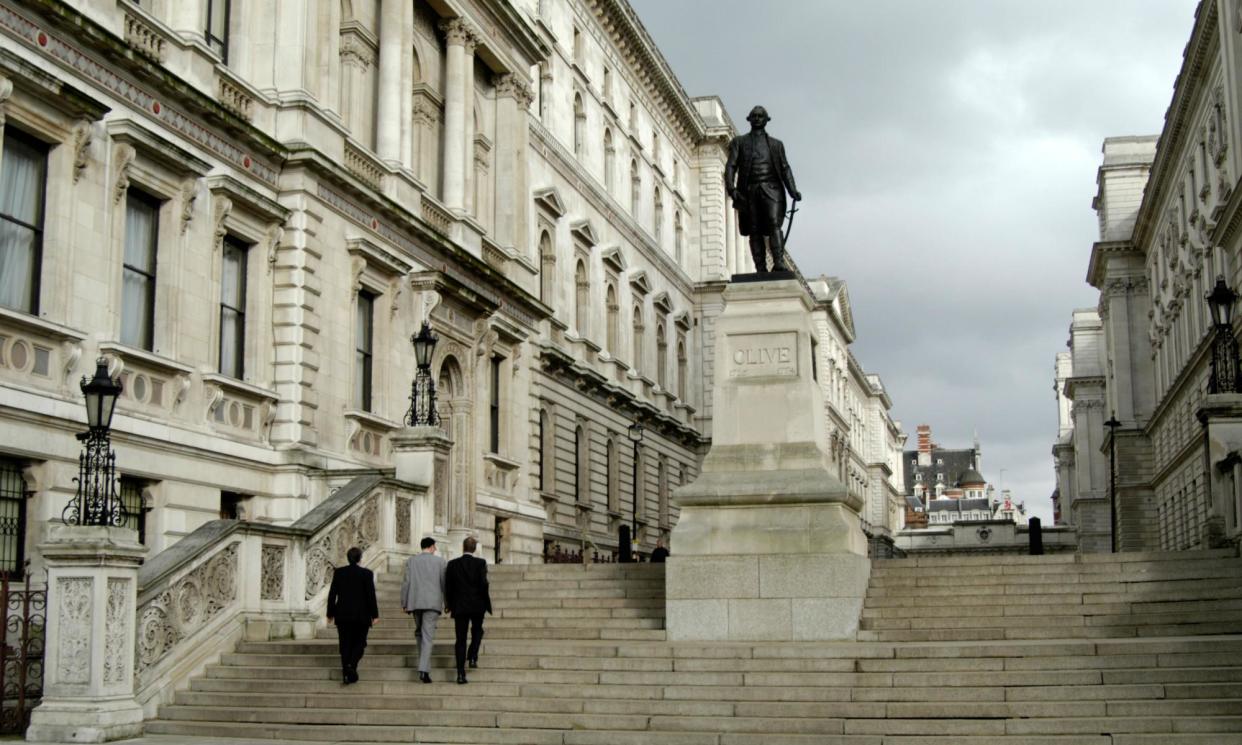Foreign Office is ‘elitist and rooted in the past’, says new report

Photograph: Alex Segre/Alamy
A powerful new international department would help Britain adapt to being a middle-rank power and shed a Foreign Office identity that is “somewhat elitist and rooted in the past”, says a damning report by some of the UK’s leading diplomats.
The report, clearly directed at an incoming mission-based Labour government, has been written by the former cabinet secretary Lord Sedwill, the former No 10 foreign policy adviser Tom Fletcher and the former director general at the Foreign Office Moazzam Malik, among others.
It urges that 1% of gross national income is devoted to international engagement, including aid, to complement the commitment to 2% of GDP on defence spending.
The report, entitled The World in 2040: Renewing the UK’s approach to International Affairs, says the Foreign Office was “struggling to deliver a clear mandate, prioritisation and resource allocation”, adding: “The Foreign Office all too often operates like a giant private office for the foreign secretary of the day, responding to the minister’s immediate concerns and ever-changing in-tray.
“The merger of Foreign Office and the Department for International Development, to create the Foreign, Commonwealth & Development Office (FCDO), was presented as an opportunity to leverage the strengths of both departments: short-term diplomacy and a long term strategic focus on real world challenges. But it has struggled to deliver. A more effective approach requires a sustained focus on the international challenges that will shape the UK’s prosperity and security.”
The report continues: “The physical surroundings [of the Foreign Office headquarters] also hint at the Foreign Office’s identity: somewhat elitist and rooted in the past. Modernising premises – perhaps with fewer colonial-era pictures on the walls – might help create a more open working culture and send a clear signal about Britain’s future.”
It suggests a model similar to Canada and Australia, where a revamped international department has a strategic oversight over not just aid and diplomacy, but the climate emergency and trade.
The report says: “We cannot simply brush aside concerns around the UK’s historical legacy and questions of nationhood. The exit from the EU has opened many questions, including in Northern Ireland and Scotland.
“Former colonies are making increasingly vocal demands around the need for reparations from colonialism and compensation for the loss and damage arising from historical industrial emissions.”
The paper goes on to state that discrepancies “between our domestic and international conduct on issues such as climate change and human rights not only exposes us to accusations of hypocrisy on the world stage but also weakens the institutions and values essential to the UK’s interests”.
It suggests: “The UK has often sought to project an image of ‘greatness’ to the world that today seems anachronistic. We will be envied for what we are good at, not what we say that we are good at. This means the state working hand-in-hand with our universities, our creative sector, our sports bodies, news and civil society organisations, so they can serve as effective ambassadors for the UK and maximise the country’s considerable ‘soft power’.”
Calling for greater realism as a middle-rank off-shore nation, the paper says the UK “should not always see ourselves as the leader in efforts to tackle global challenges. UK convening power has achieved significant results. But effective solutions to global problems in a multi-polar world need a wider array of leaders. We should give space, be more of a ‘team player’, showing humility and respect, ready to follow and support wherever appropriate.”
In his foreword to the report, Sedwill says: “For the past decade, we have been wrestling with our national identity, to the bewilderment of our allies and the glee of our adversaries.”
He says the task is to harness the country’s strengths – including possessing the world’s sixth-largest economy, some of the best universities, world-class diplomatic, intelligence and security services, a formidable military and a leading international development network.
The report says: “As we move towards 2040 and beyond, the UK will not be able to rely on just its traditional alliances with the US and Europe to defend interests in the same way. Globally, economic and geopolitical power will be more diffuse as regionally strong countries – ‘middle powers’ – exert greater influence over international affairs.
“This does not mean that the UK will retreat from existing alliances, but we will need to build new issue-based alliances with states whose interests and values may be less closely aligned. We have historically under-invested in our relationships with Asia and are at risk of doing the same with Africa now.”

 Yahoo News
Yahoo News 
